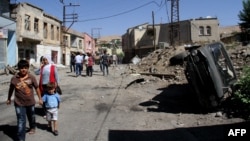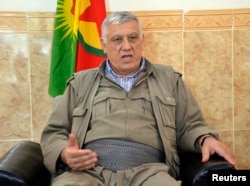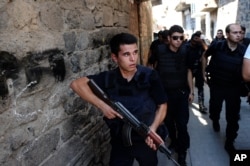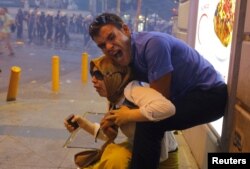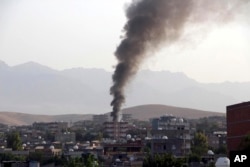Kurdish separatist leaders have dismissed appeals from Turkish opposition politicians to halt their attacks on military personnel, arguing that to do so would amount to a “one-sided” cease-fire.
Speaking to a German newspaper Monday, Cemil Bayik acknowledged “neither Turkey nor we can solve this problem with arms.”
But Bayik added that the outlawed Kurdistan Workers’ Party (PKK) had called for a cease-fire eight times but with no response from the Turkish authorities.
“So there will be no more one-sided calls to silence arms,” he said.
Blame game
The separatists’ ruling out of a cease-fire came as both sides — Ankara and the PKK as well as their supporters — traded allegations about who is to blame for the renewed violence in southeast Turkey and the breakdown of a peace process.
Turkish officials insist Kurdish separatists were never ready to lay down their arms and were even preparing for a resumed conflict during the on-and-off peace talks.
About 60 Turkish security personnel have been killed by the PKK in the past month, according to an official tally. And since clashes resumed, about 771 separatists have been killed — mainly casualties sustained during Turkish airstrikes on the outlawed group’s bases in northern Iraq and southeast Turkey.
Many of the PKK attacks have been roadside bombings, and Turkish military officials claim the improvised explosive devices (IEDs) were installed months ago. One of the deadliest bombings came in the southeastern province of Siirt last week claiming the lives of eight soldiers.
According to the Turkish military, the bomb was detonated as a military convoy passed.
President Recep Tayyip Erdoğan has insisted the PKK must surrender its weapons and has promised to pursue a military campaign against Kurdish militants “until not one terrorist remains.”
Intensified attacks
The PKK announced that it was intensifying attacks in mid-July over what it said were violations by Turkish security forces of a 2013 cease-fire.
The violence worsened dramatically after a deadly jihadist bombing in the southeastern mainly Kurdish town of Suruç on July 20.
The PKK alleges Turkish authorities have colluded with jihadists — an allegation firmly denied by Ankara.
Following the upsurge in PKK violence, Turkey launched airstrikes against PKK bases as it announced it would take a more forthright role in the U.S.-led coalition against Islamic State extremists as Washington has urged since last year.
The PKK has waged a three decade insurgency since 1984 for greater autonomy for Turkey's Kurds.
The upsurge in violence is reminiscent of the bloody years of the 1990s, when more than 40,000 lives were lost, according to newspaper columnist Cengiz Candar.
“The hopes that came with the peace initiative at the end of 2012 have been shattered. The hostilities have resumed between the Turkish government and the PKK, and each side blames the other for the collapse of the cease-fire," Candar said.
Blame game
The blame game isn’t just an academic exercise. Who the public views as the most culpable could have enormous political implications for the results of a snap parliamentary election President Erdoğan announced Monday.
In June his ruling party the Justice and Development Party (AKP) failed to secure a majority, mainly thanks to an upsurge in support for the centrist pro-Kurdish People’s Democratic Party (HDP), whose leaders have criticized the government’s ongoing anti-terror campaign, claiming the AKP is seeking political gain by creating a perception the country is under existential threat as much from the Kurds as Islamic extremists.
In recent days AKP officials told VOA they are seeing a slight jump in AKP support in private polling. But public opinion appears to be volatile and open complaints by some military officers during funerals for personnel killed by the PKK hold electoral risks for President Erdoğan.
A lieutenant colonel angrily rebuked the government Sunday during the funeral ceremony for a fellow officer, his brother.
“This son of our homeland was just 32 years old. He couldn’t get enough of his country. Who is his murderer?” he shouted.
Peace process
The peace process appeared to be halting before the uptick in PKK violence and Turkish airstrikes. In June after the AKP’s electoral setback, participants complained little progress was being made.
That came as Turkish officials publicly worried about the military advances the PKK’s Syrian offshoot was making in its fight against Islamic extremists. President Erdoğan has said that Turkey can’t accept the emergence of an independent Kurdish mini-state in northern Syria.
On Tuesday following the slaying of three members of the security forces, the central government imposed an indefinite curfew on a district in the southeastern province of Diyarbakır.
The co-mayor of Diyarbakır criticized the move arguing Ankara was under-cutting the authority of local officials.
“The decisions are being taken in Ankara, as part of a war concept,” argued Fırat Anlı. “The situation can easily get out of hand, and reach a point where even a central decision to calm things down may not be enough.”




